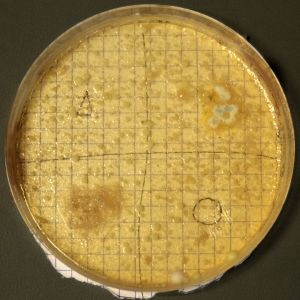No edit summary |
No edit summary |
||
| Line 1: | Line 1: | ||
[[File:_MG_9234.JPG|300px|thumb|left| | [[File:_MG_9234.JPG|300px|thumb|left|Maike Effenberg: Bacteria after one week]] | ||
''Lecturer:'' [[GMU:Mindaugas Gapševičius|Mindaugas Gapševičius]]<br> | ''Lecturer:'' [[GMU:Mindaugas Gapševičius|Mindaugas Gapševičius]]<br> | ||
''Credits:'' 6 [[ECTS]], 4 [[SWS]]<br> | ''Credits:'' 6 [[ECTS]], 4 [[SWS]]<br> | ||
Revision as of 20:10, 3 April 2017
Lecturer: Mindaugas Gapševičius
Credits: 6 ECTS, 4 SWS
Date: Thursday 13:30-16:45
Venue: Marienstraße 7b, Biolab (Room 202)
First meeting: Thursday, 13 April 2017; 13:30-16:45
Board games are usually designed for people, but could we think of a board game designed to be played between humans and flies or between bacteria and yeast? What about a more complex game involving humans, microorganisms and objects?
The aim of the course is to grasp the environment and interactions of chosen organism(s). While trying to understand biological sensors of living organisms (light, motion, temperature, magnetic fields, nutrients) we will envision and implement strategies for interaction between humans and nonhumans. The course will include analysis of sensorimotor activity of the selected organisms, discourses around similar artworks and discussions on interactivity in a physical environment.
The course will be held in the DIY Biolab of the Media Environments chair. The developed games will be presented during the planned show in the Fall of 2017.
Application
Please send a motivation letter before April 8th, 2017 to mindaugas.gapsevicius [ät] uni-weimar.de
To: mindaugas.gapsevicius [ät] uni-weimar.de
Subject: Boardgames /// Application
Content:
- Your motivation to join the course
- Name, Surname
- program and semester (Studienprogramm und Fachsemester)
- matriculation number (Matrikelnummer)
- Valid email address @uni-weimar.de
Grading
20 % Theory
50 % Practical implementation of the project
30 % Documentation including 10% of updates in Wiki
Eligible Participants
Undergraduates and graduates enrolled in the faculties of Media and Design.
